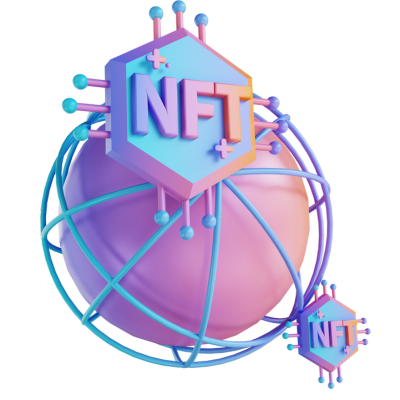Introduction
The digital revolution continues to disrupt traditional business models, and one of the latest innovations leading the charge is the rise of Non-Fungible Tokens (NFTs). With their unique ability to represent ownership and authenticity in the digital realm, NFTs are reshaping industries across the globe. From art and entertainment to real estate and branding, businesses are finding innovative ways to harness this technology to drive value, enhance customer experiences, and explore new revenue streams. Let’s delve deeper into how NFTs are shaping the future of business.

Understanding NFTs and Their Business Potential
Revolutionizing Art and Entertainment
The art and entertainment industries were among the first to experience the disruptive power of NFTs. Artists can now tokenize their work, ensuring authenticity and earning royalties every time the piece is resold. This eliminates intermediaries and allows creators to connect directly with their audience.
Similarly, musicians and filmmakers are leveraging NFTs to fund projects, offer exclusive content, and build stronger relationships with fans. These innovations are transforming traditional business models and paving the way for greater inclusivity and empowerment for creators.

Case Study: NFT-Powered Fan Engagement
Consider a music artist who releases limited-edition NFT albums. Each token grants the holder access to exclusive behind-the-scenes content, concert tickets, or personalized interactions. Such applications not only provide additional revenue streams but also create a deeper connection between the artist and their audience. By partnering with companies offering NFT development services, creators can seamlessly integrate these strategies into their brand.
Transforming Real Estate Transactions
Real estate is another sector witnessing a paradigm shift thanks to NFTs. Tokenizing real estate assets allows properties to be bought, sold, and traded with unparalleled transparency and efficiency. Imagine owning a fraction of a luxury property or verifying the authenticity of a deed using blockchain technology, NFTs make this possible.
By enabling fractional ownership, NFTs open up real estate investments to a broader audience, allowing individuals to invest in high-value properties without requiring substantial capital. Businesses in the real estate sector are collaborating with NFT token development experts to streamline these processes and enhance accessibility for investors.
Branding and Marketing in the Age of NFTs

In the competitive world of branding and marketing, NFTs are emerging as powerful tools to engage audiences and build loyalty. Brands are creating limited-edition digital collectibles, loyalty rewards, and immersive experiences using NFTs. These tokens not only add value to marketing campaigns but also create a sense of exclusivity and ownership among customers.
For example, a fashion brand might release a digital collection of NFT outfits that customers can “wear” in virtual spaces. By doing so, they tap into the growing metaverse economy while strengthening their brand identity. Partnering with an NFT token development company can ensure seamless execution and alignment with brand goals.
- Creating Exclusive Digital Collectibles for Brand Engagement
- Leveraging NFTs for Customer Loyalty Programs
- The Role of NFTs in the Metaverse Economy
- Integrating NFTs into Marketing Campaigns
- Partnering with NFT Token Development Companies
Enhancing Customer Experiences
NFTs are also being used to elevate customer experiences across industries. Hotels and airlines, for instance, are exploring NFTs as part of their loyalty programs, offering exclusive perks and benefits to token holders. Similarly, sports teams are using NFTs to sell digital memorabilia or provide unique fan experiences, such as virtual meet-and-greets with players.
Addressing Key Challenges
While NFTs present numerous opportunities, businesses must also navigate certain challenges. The energy-intensive nature of some blockchain platforms, regulatory uncertainties, and the need for user education are hurdles that require attention. To mitigate these issues, businesses are turning to NFT development services that specialize in creating sustainable and user-friendly solutions.
Additionally, maintaining the authenticity and security of NFTs is crucial. By collaborating with experienced developers, companies can ensure their digital assets are protected and accessible to their target audience.
The Future of NFTs in Business

As technology continues to evolve, the role of NFTs in business will only grow. From revolutionizing supply chains to redefining customer engagement, the potential applications are vast. Businesses that embrace this innovation early will be well-positioned to lead in their respective industries.
For instance, the fashion industry is exploring NFTs for verifying the authenticity of luxury goods, while the gaming sector is creating immersive experiences with NFT-powered virtual items. In every case, an NFT token development company can play a pivotal role in bringing these ideas to life. Here are some i
- NFTs as Tools for Brand Innovation
- The Role of NFTs in Building Digital Economies
- Adopting NFTs for Seamless Business Operations
Empower Creativity with NFTs

Conclusion
NFTs are not just a trend , they are a transformative force reshaping the way businesses operate and interact with their audiences. By unlocking new possibilities for ownership, engagement, and value creation, NFTs are paving the way for a more inclusive and innovative business landscape.
Whether you’re an artist, entrepreneur, or established corporation, embracing NFTs can open doors to untapped opportunities. With the support of NFT development services, businesses can navigate this exciting frontier with confidence, ensuring sustainable growth and success in the digital age.You can read more about how to create a successful NFT Marketplace of Gaming assets : Creating a Successful NFT Marketplace for Gaming Assets



